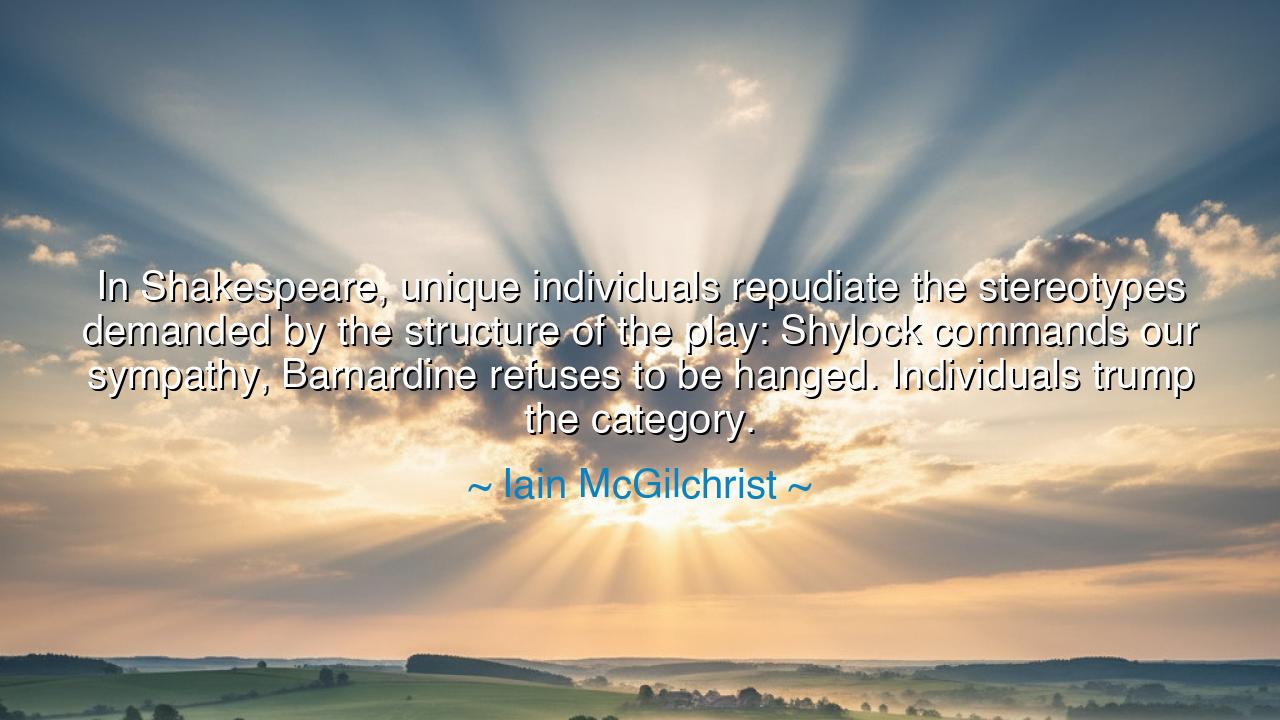
In Shakespeare, unique individuals repudiate the stereotypes
In Shakespeare, unique individuals repudiate the stereotypes demanded by the structure of the play: Shylock commands our sympathy, Barnardine refuses to be hanged. Individuals trump the category.






"In Shakespeare, unique individuals repudiate the stereotypes demanded by the structure of the play: Shylock commands our sympathy, Barnardine refuses to be hanged. Individuals trump the category." These words by Iain McGilchrist echo the timeless power of Shakespeare’s characters, whose complexities transcend the simple labels and stereotypes that society imposes upon them. McGilchrist’s reflection reveals how Shakespeare’s genius lay not in creating characters that simply fit the roles prescribed by society or the structure of the play, but in creating individuals—beings so rich in depth and conflict that they shatter expectations and demand to be seen on their own terms. Shylock, the Jewish moneylender, is no longer a mere villain; he becomes a figure who evokes sympathy and challenges our assumptions about justice and revenge. Similarly, Barnardine, the prisoner in Measure for Measure, defies the expected outcome of his execution, asserting his autonomy in a way that highlights his individuality over the categorical rules of the play.
At the heart of Shakespeare’s work is the celebration of the individual. His characters are not mere archetypes or representations of broader societal categories; they are deeply human, shaped by their fears, desires, and inner conflicts. Take, for example, Shylock, who, often reduced to a caricature of greed and vengeance, is given voice in a way that forces the audience to consider his humanity. His famous speech, “Hath not a Jew eyes?” resonates with deep empathy, as Shylock rejects the idea that his identity and suffering should be reduced to societal prejudices. He becomes a symbol not only of victimization but also of the complexity of human emotion and the consequences of alienation.
In the case of Barnardine, Shakespeare creates a character who embodies rebellion and the will to refuse the fate imposed upon him. While the play’s structure demands Barnardine’s death, his refusal to conform—his decision not to be hanged—adds another layer to Shakespeare’s exploration of individual freedom. Barnardine does not fit into the moral structures of the play, and his insubordination speaks volumes about the tension between individual will and societal constraints. Through such characters, Shakespeare shows us that even within the rigid confines of societal expectations, the individual can assert their autonomy, reshaping the story and its meaning in the process.
The power of Shakespeare’s characters lies in their ability to transcend the simple categories into which they are placed. Consider Macbeth, who, while initially appearing as a straightforward tragic hero driven by ambition, ultimately reveals a man tormented by guilt and conscience. Through the layers of his internal struggle, Macbeth rises above the confines of the heroic archetype, challenging us to see him as a deeply flawed individual. King Lear, too, defies expectations, evolving from a monarch into a man broken by the weight of his own decisions, mankind's frailty, and the cruelty of fate. These characters are not bound by the roles they were meant to play but instead emerge as distinct individuals whose actions and choices shatter the structures imposed upon them.
This theme of individuality against societal norms extends beyond the stage of the theater. In the real world, too, we often encounter moments where the individual is expected to conform to the roles and categories that society deems appropriate. It is in these moments that true courage is born—when a person, like Shylock or Barnardine, refuses to be defined by the stereotypes thrust upon them. Think of Rosa Parks, whose refusal to give up her seat on a segregated bus was an act of defiance against the racist structures of society. She did not simply play the role of the obedient citizen; she became a symbol of individual courage in the face of systemic injustice, a living testament to how one person’s act of defiance can reshape an entire society.
The lesson to be drawn from Shakespeare’s characters and McGilchrist’s analysis is that we are all, in some ways, bound by the structures and roles that society has imposed upon us. Whether those roles are based on race, class, gender, or occupation, we must remember that our individuality is not defined by these categories. True greatness comes from the ability to see ourselves—and others—not as products of social expectations, but as unique, complex, and dynamic beings. The challenge, then, is to embrace our own identities and to reject the labels that seek to confine us. Like Shylock or Barnardine, we must be willing to assert our humanity and autonomy even when the world around us insists on reducing us to something far simpler.
In practical terms, this means that we must actively resist the pressures to conform to societal norms or expectations that do not align with our truth. It means taking the time to understand the depths of our own identity and embracing the uniqueness of our journey. Just as Shakespeare’s characters challenge the roles thrust upon them, so must we challenge the limitations placed on our potential, seeking to become not just what is expected of us, but what we are capable of becoming. The world needs more individuals who are not afraid to step out of the boxes that others have built for them, and who are willing to live authentically, in full recognition of their own complex, multifaceted selves.






AAdministratorAdministrator
Welcome, honored guests. Please leave a comment, we will respond soon